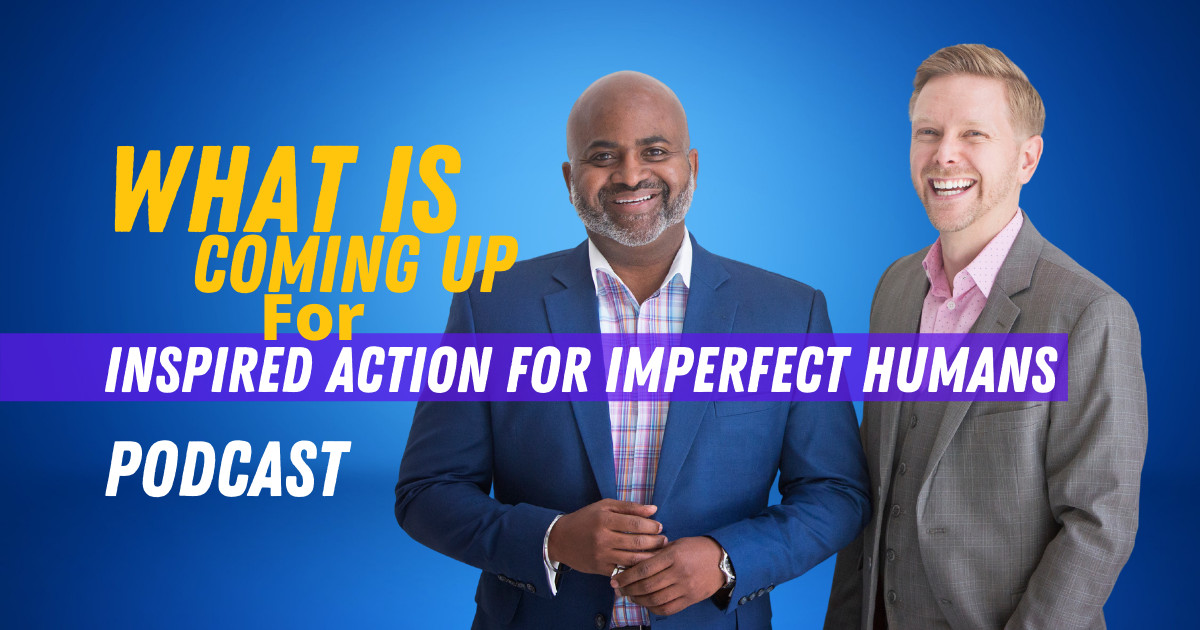“What’s Coming up for Inspired Action For Imperfect Humans?” Brief Summary of Show:
Leadership, vulnerability, failures, successes… Here’s what’s coming up for the coming season of Inspired Action For Imperfect Humans Podcast!
Calls to Action:
Tell us your “inspired stories” stories by visiting www.InspiredActionPodcast.ca
Christopher Lawrence LinkedIn: https://www.linkedin.com/in/career-life-coach-christopher-lawrence/
Kyle Kalloo LinkedIn: https://www.linkedin.com/in/kyle-kalloo/
Change My Life Coaching & Partner Groups LinkedIn: https://www.linkedin.com/company/6446498/admin/
“What’s Coming Up for Inspired Action For Imperfect Humans” Transcript:
[00:00:00] I’ll collect. We’ve just finished since then. I know how exciting was that. I can’t even believe it when someone said that it was like 30 something episode, like we just kept going and going and going in. You’re kind of like a stickler for five more episodes. 10 more episodes. That’s record five episodes today, guys.
He was crazy with the amount of episodes he wanted. Like we could just kept talking. I’m sorry. Anyway, so guys, thank you for listening to season two of our inspired action for imperfect human. So although we’ve come to a close, there’s a few things coming up, like, what does that mean for us? Well, first thing that I want to let people know is that we will be back on January 4th with season four of the podcast, and we’ve got a whole bunch of new, exciting topics.
Um, so we’re going to really dig [00:01:00] into some things. I think that people really enjoy feeling validated. The feedback we’ve had. Is it. Enjoy feeling validated saying that I don’t, I’m not the only one that thinks this way. And so I think that we’re going to continue to build off of those topics, which unfortunately puts you in a limelight in a lot of liabilities.
So if you feel like resigning today, go ahead. Second thing. Well, hold on, hold on there for a second. Hold on there for a second. Cause not only that folks really enjoyed it, you know, a couple of the feedback we also got is that it’s, bite-sized like it wasn’t long. It was just enough for them because we know sometimes people need time to think reflect, um, take action on certain things.
So that’s what was really nice about it. Um, and I think people also, I mean, Lauded amount of people saying how you abuse me, how I was victimized during this whole process, which I think is, is fantastic. So yeah, I think that’s awesome. So people are probably wondering Kyle, um, What are they going to [00:02:00] do in the interim?
Right. And they’re probably a little confused, cause I said, we were going from podcast two to podcast four. And so here’s, what’s, here’s, what’s happened folks. I’m on human resource probation. I’m not allowed to be on the podcast. And you know, who’s in charge of Kyle is our CEO of puzzles, our HR. So I mean, there’s no, there’s no conflict of interest there.
Um, so he has actually kicked me off the puck. For a few episodes for, well, really season three. So I think it’ll probably be two months Kyle, uh, for, from, from starting next week, which I think is November nine, um, all the way until, um, yeah, right after nine. Cause this, this is airing on the ninth, so yeah, on the night.

So, so from November 16th to basically December 28, I have to grin and bear it and nod their heads and just get through what you have [00:03:00] planned for the actually, I am really excited about what you’re doing, despite the fact that I dislike you so tremendously. I think this is probably one of the best ideas you’ve ever had in your whole life.
We don’t, and we don’t get many, so, wow. So you’re saying as a true immigrant, I’m the only immigrant left that I still have to work while you take a break. Is that what. Okay, hang on. I did not say that I wasn’t working during this time. Why don’t you tell me, um, let’s let’s let’s actually just start with, what are you talking about for season three, this little mini season that you’re doing?
What, what are you going to be talking about? Yeah, that’s a really, that’s a really great question only because what happens? You don’t have to tell me, it’s a good question. I know it’s a question. I just need you to answer it. Well, here’s a little bit of context, [00:04:00] right? So as you know, and I know, you know, this, I work with a lot of senior leaders and then leaders, emerging leaders, people who either want to get into leadership, people who want to understand, you know, leadership a little better.
There’s some people who just like, how do I up my game, right. With leadership. And so every time I’m usually. Talking to at a certain event or something like that. Ultimately, as people are, will come up to me and they just kind of want to understand, like, why does my leaders do this? Or why do leaders in general, you know, think a certain way, you know, act a certain way.
Or sometimes don’t even provide that type of mentorship. So, you know, they’re asking really. That, what I would like to say is, you know, dis bunk the misconception out there of leaders. Right? So the part that really they want to understand is the human side, right? Because they’re human. I know you may feel that sometimes they’re not just by how they do and think and say things, but they’re humans and which means like our podcasts, you know, they are also imperfect, right.
They [00:05:00] have taken some inspired actions along the way. So I kind of wanted an opportunity to show. So, so Kyle it’s, it’s kind of like you’re tapping into the mindset and the human aspect of how some of these executive leaders thing and some of these CEOs you’re tapping into some of that. So this is, this is probably good for people who want to understand how their leaders work so that they can tap into that mindset.
But who else is this? Yeah. You know, this is great because before I get into that is like what we’ve said on the podcast with those who are listening in season two, right? Is that some leaders show up a little bit differently. And sometimes, you know, I think we mentioned the whole open door policy, right?

Cause I hear that quite often from leaders who will say, Hey, I have an open door policy. You can, you could come in, you can come in at any time. And sometimes what they don’t realize is the open door policy is there for them to also want. Right is for them to also [00:06:00] tap into that. So the idea is we really want people, you know, uh, listening on the mini series of season three is more about emerging leaders, either you new to leadership, want to think about leadership or your senior leader, and you want to take your leadership game to that next level.
And this is really going to offer those. The mentorship as well. Cause that’s the other thing, unfortunately, that they don’t seem to tap into, right. Is those are folks that don’t have any interest in aspiring to leadership. How might this help. This will help them because at some point they have a leader, right.
So how do they actually manage op how do they, uh, understand maybe what their leadership in the organization might be thinking or doing, and really kind of it’s like most things, this is so transferrable for you to even be a better team member. Cause you know, we’ve done some recordings already. So I’m going to give you guys a little sneak peek there.
We’ve done some of the recordings already for the, for the [00:07:00] season three and. Interesting to hear from some of these leaders, when they start out, they didn’t start out as a leader. Some of them didn’t even want to be a leader. Some of them thought that wasn’t even an option. So to your point, you never know if you’re going to be a leader or for one particular person that we’ve recorded already.
He was placed into leadership. Like there was no option, like he just had to be. And, you know, he wished he had some of this knowledge prior to doing. Well, and I know Kyle that you tap into some of the imperfect parts of it too. And I think that this is really important for people because certainly doing what we do for a living, uh, you know, particularly in my practice, there’s so much focus on, on the employee.
Aspect of this, that the, you know, the team member or the, or the, you know, for lack of a better term to subordinate, I hate that word, but there’s this hierarchy that’s created in the minds of, of the, of the employee in their minds. And so they’re intimidated to talk to their leaders, their intimidate. [00:08:00] And have a conversation with them.
They’re intimidated to even ask the question, why are we doing this? Like, how does this help us? How does it, you know, if they’re intimidated to even bring that support. And then what I would just say is that I think the value is really there for those people and understanding how these folks think. How can you tell us some of the, like one or two of the names that you’ve got coming in and, and who you’re talking about?
Yeah, this is great. Great question. We have, uh, Shane Wenzel from Shane homes or the CEO president from that is going to be on there. Um, we have Marshall Toner from JLL, Canada, and Damien mill. These are executive leaders in these organization, Glenn mangling as well from first service. Did he, the president of.
Uh, for services. And so he has a really interesting perspective on leadership as well. And then we have, um, April crane from WestJet, uh, she’s a senior leader in the communication side of it. So, and there’s a few more we’re working on, but that’s just the, the top of the head names. [00:09:00] This sounds super cool to me.
And I cannot wait to hear. Uh, from some of these leaders and kind of how they think come, where do you take this on the podcast? So if we’re going to listen, because clearly I’m not allowed to participate. So, so what can I expect when I sign in like everybody else on the planet and listen to this? You know, I I’m sure people are going to send us some things like where’s Christopher.
Like what, what would Christopher has to say about this? But listen, we’ll, we’ll definitely be able to take a look at that as far as where do I take them? You know, by listening, you will gain. I find everyone who’s listening is going to be able to gain a better understanding of what it takes to deliver at a senior level at, even in leadership.

Cause there’s a few of them. We’ll talk about. Up and coming leadership get real on some strategies and tactics, right? When it comes to curating that coaching culture in an organization, right. Which is about making sure people have access. This is not just for executive levels, [00:10:00] right. It coaching is, is about how do we, you know, allow frontline to have better insights, gain insights about their, their own skillset.
And as well as these leaders, you know, what’s interesting about it is they actually tap into some of their. And what they deem to be success, um, to be successes as well. So, you know, that is a journey I really want to take them on is for them to hear what their experience has been like, what could some things that they can do, right?
So the people who were listening, uh, what are some things that they can do in the reflection and get to where they are today and how they define failures and successes that I think is going to be really the most interesting is hearing what they defined as a failure and what success looked like for them.
I agree. Give me one or two of the questions that you ask these people. Cause I’m, I’m curious to see like, like, you know what, where’s the gossip like, what’s the, nitty-gritty on it. Just one or two, the questions you’re asking these people, but that folks [00:11:00] aren’t going to want to tune in for. Yeah. You’re sounding like you’re asking what’s the T right?
Is that what you’re saying? Like the cheeky girl and then we’ll see the shade. You’re here. So questions I think about is what do, what did they think leadership was when they first started? You know, and what has that journey been like for them? You know? Cause I think sometimes we have this perception that as a senior leader, they get everything, everything is easy for them.
They was probably on a certain pirate and some people may not think that, but they may not know actually about the journey. So I ask about that. Another question I really kind of hone in on is, you know, what are some of your key. Yield failures. And how did they even address that? Especially that common thing that we’ve talked about.

I know you and I talk about it often we blog about it as well as that fear of failure concept. Right. And so I really want to talk to them about, you know, what does that look like? The other part of it is what is the silver lining for some of those, with some of those failures, like. Did it work out for [00:12:00] them?
Did it not work out? You know, what would they do even differently, uh, would be some of them. And this is always my favorite question. When we talk about this, um, is about what would they tell a younger, uh, leader? What would they tell someone who’s maybe new to leadership who wants to cause the head fake on that question?
Christopher is more about what are they telling their, their younger self. If they could speak to their younger self, when it comes to this type of thing, what would they actually. I think that question really is it’s. What are you telling yourself now? Interesting. Interesting. I love that. Never looked at it that way.
I love, and let’s just put a full stop on where did you fail? Because I think that people really need to, like, people need to understand that every single one of these leaders has had failures. And I think it’s super important for, for folks who are not in the. Or emerging leaders to recognize, like you’re not an imposter and you’re probably going to fail at some stuff.
So I, I, you know, I’m really looking forward to this client. [00:13:00] Um, what is one last thing that people need to know? Um, just about this podcast, what’s something that they need to know as they step into it. I think, you know, well, they need to know. Yeah. Like everything else that we have misconceptions, right? We have a story, be tell herself, and this is not new for anyone.
We also tell ourselves a story. And these guys are senior leaders, no matter where they are in the chain of leadership, um, they too have failures and they are imperfect humans, you know, and what’s interesting about. VR is they have no problem stepping into it. They actually step into that. Right. And you’ll hear some of those things then, you know, some of them have even used that word that I struggled with.
Right. That you kept pushing down my throat, the vulnerability word. Right. And some of them is that, listen, I had to be vulnerable. I had to do those things. And so I know I struggled with it in, you know, in the beginning. Not because, I mean, I’d like to say now, because I don’t want to be vulnerable is because I was so [00:14:00] always looking at moving forward, moving forward and I missed opportunities to slow down.
Right. How many times have you said that to me? Slow. Oh, wait, did you ever,
um, man, you know, we, we know that, uh, th there’s some research on, on coaching cultures out there, and we know that in terms of bottom line employee productivity, loyalty, the whole. Um, there’s research that supports a culture of coaching. And so I really do believe that that this podcast is going to be fun.
It’s going to be inspiring. It’ll be something a little bit different as we head into the Christmas break. Um, folks I’m, I’m planning on sneaking in at least once a here before, before January 1st, but don’t tell Kyle probably doesn’t need to know. Awesome. Well, thank you very much, Kyle. I’m looking forward to this.
I hope that our listeners are too. And, um, yeah. Good luck. [00:15:00] Thank you. And let us know if, you know, as we’re going through the mini series of this is something that later on you want us to bring back or you want to know more of that type of feedback would be fantastic. And don’t forget if you’re not sharing our podcast.
What are you doing? Where are you folks? Come on, share it, read it, you know, let us know what you think. Also, if you’d like to hear me have my own mini series about something that’s really interesting. Tell us. Oh, okay. All right then.



